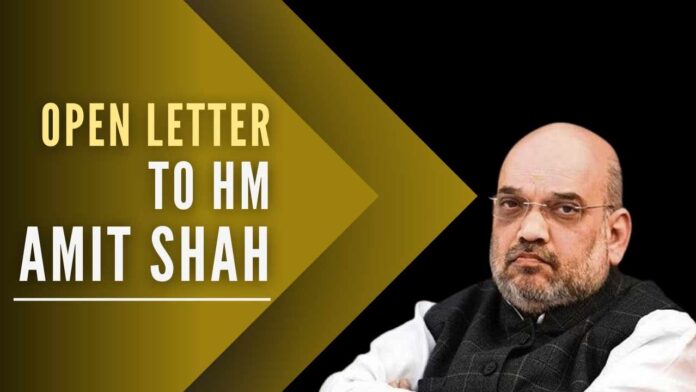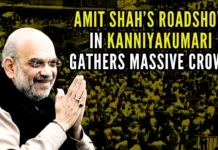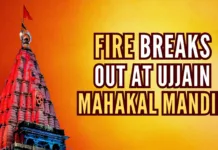
Dear Mr. HM Amit Shah,
I write to you today as a student of history, senior citizen, and a man on the spot to congratulate you for your October 5 Srinagar’s Baramulla unambiguous statement that “there won’t be any talks with Pakistan but only with the youth of J&K” on the state’s future. The nation will always appreciate your stand on the aggressor Pakistan, whose single-point agenda all along has been to grab J&K on the spurious ground that it’s a Muslim-majority region. The nation will also remain indebted to PM Narendra Modi and to you for rendering the essentially separatist Kashmiri leaders of all hues ineffective and unreal for all practical purposes on August 5-6, 2019 by diluting the seditious Article 370; abrogating the discriminatory Article 35A; separating Ladakh from J&K and granting it the status of UT; converting the remaining J&K also into UT; applying all the Central laws to J&K; abolishing the archaic system of a Durbar (seat of government) move from Jammu to Srinagar and back every six months; making Hindu-Sikh refugees from Pakistan living in Jammu since 1947, Gorkhas and members of the Valmiki samaj J&K’s full-fledged citizens eligible for all rights and privileges, etc, etc.
However, your announcements at the public rallies both at Jammu’s Rajouri and Kashmir’s Baramulla on October 4 and 5 that the “Gujjar, Bakerwal and Pahari communities” (inhabiting Jammu’s Poonch-Rajouri border belt and Kashmir’s Baramulla-Kupwara and Handwara areas) will get reservation benefits like the Scheduled Tribe (ST) communities living in different parts of the country have disturbed many in J&K, especially Hindus of Jammu. It may not be out of place to mention here that the Gujjars and Bakerwals (all Sunni Muslims) and Gaddis (all Hindus) have been getting reservation benefits ever since April 1991, when the then Chandra Shekhar government granted ST status to them. Besides, they got political reservations in the Assembly after the abrogation of J&K’s separate status as per the rules and regulations on the subject in force in the country.
As for the so-called Paharis (over 90% Sunni Muslims), they have been struggling since May 1991 to get ST status on the ground that they also inhabit the areas the Gujjars and Bakerwals inhabit and their socio-economic and political life is no different from that of the tribal Gujjars and Bakerwals is no different but with no result. Neither any Union government nor any government in J&K conceded their demand for reasons not really difficult to fathom. One of the fundamental reasons was that they did not fulfill the criteria as laid down by the ST rules and regulations. To be more precise, none of the commissions or panels set up by the Union government before or after 1991 or by the J&K government considered them a distinct tribe. No wonder then that your categorical commitment that the so-called Paharis will also get reservation benefits like the Gujjars and Bakerwals has raised many questions. Some of the questions are:
Who do we call Paharis? We call Paharis those who inhabit the hilly and mountainous area.
Are the Poonch-Rajouri belt in Jammu and Baramulla-Kupwara-Handwara belt in Kashmir the only hilly and mountainous areas in J&K UT? No. The entire UT, barring the small plains in the Jammu province’s Kathua, Samba, and Jammu districts and the 80X20 sq km Valley proper in Kashmir, is hilly and mountainous.
Is Pahari a language? No, it’s not. The language these so-called Paharis speak is called Pathowari.
Do these so-called Paharis alone speak Pathowari? No, there are almost 1.5 million more such people living in Jammu province’s Jammu, Kathua, Samba, Udhampur, and Reasi districts since their migration in 1947-1948 from Pakistan-occupied-J&K (PoJK) who, like these so-called Paharis, also speak Pathowari. The fact is that PoJK consists of the areas belonging to the erstwhile State of J&K’s Poonch, Rajouri and Muzaffarabad districts.
Do these Paharis constitute a tribe like the Gujjars and Bakerwals? No, they do not. Even a superficial look at The Presidential Order of April 19, 1991; The J&K Scheduled Tribe Order of 1989; The J&K Govt Order No. 191-GAD of 1992; The J&K Govt Order No. 44 GAD of 1997; Walter Lawrance’s The Valley of Kashmir; T Graham Balley’s Linguistic Studies From The Himalayas, Asiatic Society, London, 1908; George Grierson’s Linguistic Survey of India, Vol V, part IV; and Census of India, XII. Part 1, 1941 would help us conclude that there exists no such tribal group as Pahari anywhere in J&K, nay anywhere in the world.
Will it be fair to consider the people inhabiting the Poonch-Rajouri belt in Jammu and Baramulla-Kupwara-Handwara belt in Kashmir as Paharis and not consider as Paharis the people (over 80% Hindus) of Jammu province’s highly mountainous and treacherous, difficult and inaccessible Ramban, Kishtwar, Doda, Udhampur and Reasi districts and parts of its Kathua, Samba, and Jammu districts? Or, will it be fair to consider Pahari Sheikh Abdullah or Khan or Peerzada or Bukhari, etc inhabiting the Poonch-Rajouri belt in Jammu province and Baramulla-Kupwara-Handwara belt in the Kashmir region and not consider as Pahari Ram Lal Sharma or Zorawar Singh or Amarnath Gupta or C R Kundal or Bali Bhagat or Om Jandial, etc, inhabiting Jammu province’s highly mountainous and treacherous, difficult and inaccessible Ramban, Kishtwar, Doda, Udhampur and Reasi districts and parts of its Kathua, Samba, and Jammu districts? Clearly, the answer cannot be in the affirmative.
All this should clinch the whole issue and establish that reservation benefits only to certain sections of the population inhabiting only certain parts of J&K UT will be as irrational as it will be discriminatory.
I, therefore, ask the Union Home Ministry to:
Abandon the whole idea of reservation benefits the so-called Paharis inhabiting the Poonch-Rajouri belt in Jammu and the Baramulla-Kupwara-Handwara belt in Kashmir.
Or, grant Pahari status to the whole population of J&K so that all in the UT could enjoy the reservation benefits.
I must point out that any move on the part of the Union Home Ministry to grant reservation benefits to particular sections of people inhabiting certain areas would only culminate in political explosions in J&K, especially in the already marginalized and grossly ignored Jammu province. And, this will not be in the larger national interest.
I anxiously look forward to your response and necessary action on the very vital issue of national import.
Yours Sincerely,
Prof Hari Om
Note:
1. Text in Blue points to additional data on the topic.
2. The views expressed here are those of the author and do not necessarily represent or reflect the views of PGurus.
PGurus is now on Telegram. Click here to join our channel and stay updated with all the latest news and views
For all the latest updates, download PGurus App.
- ‘Kashmir My core constituency’: Revisiting July 12, 2003 to understand politics, Omar Abdullah-style - March 15, 2024
- Total deviation from traditional approach: Seven takeaways from PM Modi’s March 7 Srinagar visit - March 9, 2024
- Status of political parties: Why is further J&K reorganization imperative? - March 1, 2024











Indians are no longer at Home . It has been occupied.